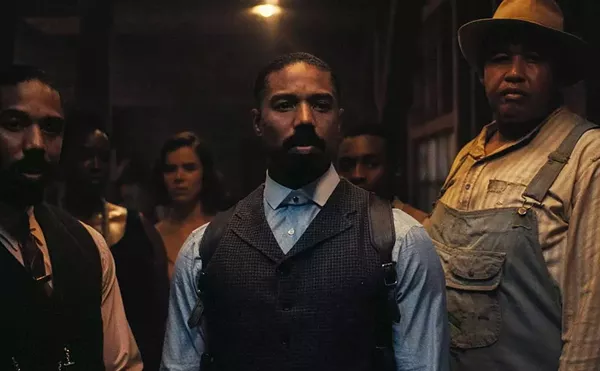
Audio By Carbonatix
[
{
"name": "GPT - Leaderboard - Inline - Content",
"component": "35519556",
"insertPoint": "5th",
"startingPoint": "3",
"requiredCountToDisplay": "3",
"maxInsertions": 100,
"adList": [
{
"adPreset": "LeaderboardInline"
}
]
}
]
It’s hard to believe it’s been 16 years since Spike Lee’s Do The Right Thing was released, provoking more than a few tense conversations about race in America. It’s harder still to believe how little Hollywood has had to say since then.
Screenwriter Paul Haggis, flush with his Oscar nomination for Million Dollar Baby, jumps into the director’s seat to bring us this sprawling yet highly personal examination of race. The writer-director delivers a film that’s eloquent, raw and poignant without falling prey to the overheated rhetoric that often plagued Lee’s work.
Set in Los Angeles, the film is a series of intertwined vignettes that occur during a 48-hour period. With the convergence of seemingly disparate storylines, the film bears more than a little resemblance to Paul Thomas Anderson’s Magnolia or Robert Altman’s Short Cuts. Where it distinguishes itself from those films, however, is in its head-on confrontation with the socioeconomic and racial lines that separate and threaten to strangle modern American society. Black, white, Latino, Asian, Middle Eastern, rich and poor; no demographic is spared the indignity of incivility, intolerance and rage. Living in a fear-based culture where every stranger is regarded as a potential enemy, Haggis presents an urban melting pot in constant danger of boiling over.
A racist cop (Matt Dillon), enraged by a black HMO supervisor’s indifference to his father’s illness, turns around and humiliates a successful African-American television producer (Terrence Howard) during a routine traffic stop, by fondling his wife (Thandie Newton). An ambitious district attorney (Brendan Fraser) and his uptight wife (Sandra Bullock) struggle with the emotional and political fallout of being carjacked by two black teens. When an Iranian shopkeeper (Shaun Toub) finds his store vandalized by racists, he unfairly blames and seeks revenge on the young Latino (Michael Pena) who replaced his lock. A highly respected detective (Don Cheadle) investigates the suspicious shooting of a corrupt African-American cop while hiding his younger brother’s criminal behavior and his mother’s heroin addiction.
In each of these stories, Crash explores barriers of class and race that prevent empathy and understanding. These characters live in well-defined enclaves that foster their ignorance, frustration and hostility. Yet despite their intolerance, they are still presented as morally rich, surprising us with moments of insight and humanity.
If Haggis is making a point, it’s that all of us are flawed as human beings, and none of us deserves to be dismissed. Furthermore, he acknowledges that not all fears and suspicions are unreasonable. Black street crime and brutally racist cops do exist, and we can’t close our eyes to the malignancy of their actions.
The uniformly impressive actors commit themselves to their roles with remarkable conviction. Matt Dillon does a terrific job of getting to the heart of his racist cop’s villainy and heroism. Howard and Newton are searingly effective as successful blacks struggling to reconcile their privilege with their racial identity. Sandra Bullock has never been so good as the angry rich-bitch housewife forced to confront her pampered life of shallow loneliness. And Don Cheadle delivers yet another thoughtful and soft-spoken performance, conveying more with his expressive brow than most actors achieve with pages of dialogue.
The film could be accused, at times, of being emotionally overwrought. The intrusive score doesn’t help, unnecessarily goosing the intensity of the film with an overbearing electronic wash. Haggis could also learn a thing or two from John Sayles — whose City Of Hope presented a similar narrative and thematic structure — about giving his characters a bit more breathing room. The film’s 105-minute running time denies them the developmental resonance they deserve.
Still, Crash is driven by the kind of storytelling that rises above personal agenda. Haggis knows how to balance thought-provoking drama with white-knuckled entertainment, and delivers a serious film that’s never preachy and often thrilling. There are moments so unexpectedly and intensely moving, you may find yourself forgetting to breathe. Honest, earnest and occasionally pretentious, Crash offers no easy answers for how to deal with the anger and distrust that simmers in each of us; it only presents its insidious influence and asks that we pay attention.
Jeff Meyers writes about film for MetroTimes. Send comments to letters@metrotimes.com.





